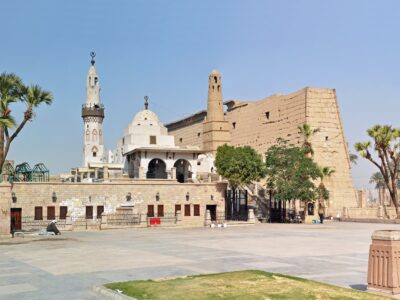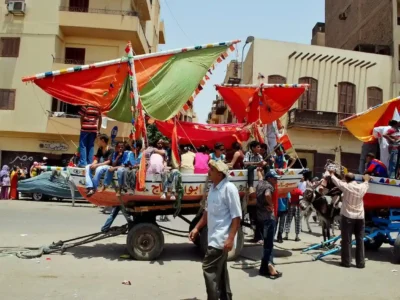Mouled Abu El-Haggag Festival
The Mouled Abu El-Haggag Festival is one of the most vibrant and culturally rich events in Egypt, celebrated annually in Luxor to honor Sheikh Yusuf Abu El-Haggag, a revered 13th-century Sufi saint. This festival blends Islamic traditions, Pharaonic heritage, and local customs, making it a unique and colorful spectacle that attracts thousands of participants and visitors.
Historical and Spiritual Significance
 Yusuf Abu El-Haggag, also known as “the father of pilgrims,” was an Iraqi Sufi leader who settled in Luxor over 800 years ago. He is considered the patron saint of the city, and his descendants still reside there. The festival is held in his honor around the Mosque of Abu El-Haggag, which itself is built atop the ancient Luxor Temple, symbolizing the deep intertwining of Egypt’s Islamic and Pharaonic histories.
Yusuf Abu El-Haggag, also known as “the father of pilgrims,” was an Iraqi Sufi leader who settled in Luxor over 800 years ago. He is considered the patron saint of the city, and his descendants still reside there. The festival is held in his honor around the Mosque of Abu El-Haggag, which itself is built atop the ancient Luxor Temple, symbolizing the deep intertwining of Egypt’s Islamic and Pharaonic histories.
The festival takes place during the Islamic month of Sha’ban, which precedes Ramadan. Its timing shifts annually due to the lunar Islamic calendar. The event lasts for several days, culminating in a grand finale known as al-dora.
Key Traditions and Activities
The Mouled Abu El-Haggag Festival is a multi-day celebration filled with vibrant processions, spiritual rituals, and traditional entertainment. Some of its most notable features include:
1. Procession of Boats
A highlight of the festival is the parade of boats carried on donkey-driven carts. These boats symbolize Sheikh Abu El-Haggag’s journey to Luxor and are reminiscent of Pharaonic solar barque processions. This tradition reflects both Islamic and ancient Egyptian symbolism, with the boat often representing spiritual knowledge.
2. Sufi Zikr Rituals
Sufi zikrs (ritual chanting) play a central role, especially during Layla Kebira (the Big Night). Men gather in rhythmic unison to chant praises of God, often entering a trance-like state. These rituals are accompanied by traditional Sufi music and can last for hours, creating a deeply spiritual atmosphere.
3. Tahtib Competitions
Tahtib, an ancient Egyptian martial art involving stick fighting, is a popular activity during the festival. These competitions showcase agility and skill, blending combat techniques with dance-like movements. The stick fights are accompanied by rhythmic music, adding to the festive energy.
4. Horse Racing
Horse races are another major attraction. Riders display their skills by balancing long sticks while racing, showcasing both their horsemanship and physical dexterity. The horses are often adorned with elaborate saddles featuring gold and silver threads.
5. Al-Dora Parade
The final day of the festival culminates in al-dora, a grand parade featuring camels adorned with colorful scarves and celebrants singing and dancing through the streets. The parade also includes nautical motifs, with boats symbolizing spiritual journeys.
6. Carnival Rides and Vendors
The festival features carnival rides for children and bustling markets where vendors sell sweets (halaweyyat al-moulid), party hats (tarateer), whistles (zamameer), balloons, and other festive items. The streets surrounding the Abu El-Haggag Mosque are decorated with lights, enhancing the celebratory atmosphere.
7. Communal Gatherings
Families open their homes to guests, sharing traditional meals that include dishes like rice, vegetables, and kebabs made from minced meat and wheat. This hospitality fosters a sense of community among locals and visitors alike.
8. Religious Observances
Inside the Abu El-Haggag Mosque, descendants of the saint hold councils known as Al-Dayem, recite Qur’anic verses, sing prophetic praises, and engage in religious chanting.
These activities make the Mouled Abu El-Haggag Festival a unique event that combines spiritual devotion with cultural celebration, drawing thousands of participants from Luxor and beyond.

A Blend of Past and Present
The Mouled Abu El-Haggag Festival stands out for its ability to bridge Egypt’s ancient past with its contemporary spiritual practices. The boat processions and dora parade evoke Pharaonic rituals like the Opet Festival, while the Sufi zikrs highlight the Islamic spiritual traditions that have flourished in Luxor for centuries.
Why Visit?
For visitors, this festival offers an unparalleled opportunity to experience Egypt’s cultural diversity and hospitality. It provides a glimpse into how religious devotion, historical legacy, and communal joy come together in one of Egypt’s most iconic cities. Whether you are drawn by the spiritual chanting or the spectacle of camels parading through ancient streets, the Mouled Abu El-Haggag Festival is a celebration not to be missed.
In sum, this festival is more than just an event; it is a living testament to Luxor’s enduring cultural vibrancy and spiritual depth.
